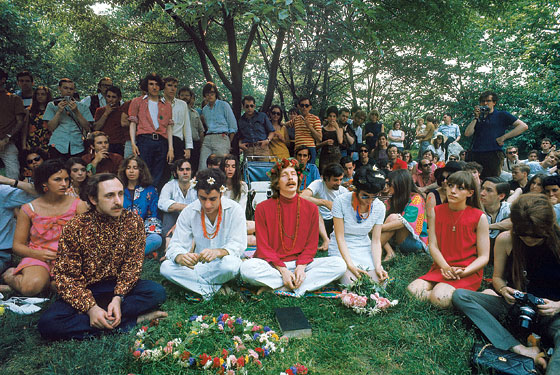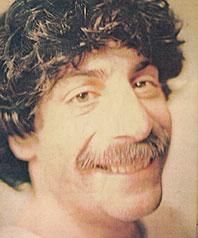
Forty years ago, at the outset of the Summer of Love, my mother and father were not thrilled to hear I’d dropped out of the University of Wisconsin—a fine, publicly financed institution—to become a redcap at the Port Authority Bus Terminal. The parents did not view this as a career move in keeping with the onward-and-upward trajectory of our family’s immigrant experience. “A porter?” my mother wailed, pacing beneath the fluorescent rings of our Queens kitchen, not unmindful that no college meant no 2-S draft deferment, which meant LBJ and General WasteMoreLand would now be free to stick me, her only son, on the front lines of the war against my hero, that great leader of the people, Ho Chi Minh.
I was sympathetic to Mom’s position, especially the getting killed part, but felt no choice in the matter. How to explain that, just as being a redcap at the grungy Port Authority wasn’t just another summer job, the upcoming July and August was not just another summer. It was a critical juncture, a decisive moment.
For the teenaged New York beatnik-in-training, the so-called Summer of Love approached as a dilemma. Here we were, under the impression we were growing up in the undisputed center (Flushing being slightly off-center) of the universe, where Dylan sauntered and there was always a really cool double bill at the Thalia. Then, without warning, the Zeitgeist dropped like a fleet of saucers on the other side of the continent. The Diggers, the Angels, the Dead, Owsley and his acid, the naked girls, they were all out there, at the end of a very, very long hitchhike.
Of course, everyone who could went out to San Francisco to check it out. Not to would have been tantamount to sticking a generational head in the sand. And yeah, it was great. Communism might have been geographically predetermined to unfold in Russia, those long stretches of tundra so conducive to lengthening breadlines. But when it came to the regeneration of the American Walden by uncounted baby-boom Adams and Eves, the dreamscape of California, with its primordial redwoods, cosmic coastline, and ahistorical behavioral blank slate, was the perfectly placed nirvana.
The problem was we were from New York. There was so much we didn’t—couldn’t—get about what was suddenly the best way to be young. For instance, it was hard to grok (to reference Robert Heinlein’s Stranger in a Strange Land, another of those lame-o Frisco required texts) terms like dirty hippie. Coming from a life on the F train, everyone out there looked so squeaky (Fromme) clean. Clean, white, blond, and tongue-tied. Where did the fuzzy unanimity of the pot-smoking masses end? Didn’t anyone ever get mad at anyone else—before they pulled out their gun and blew your head off, that is?
Truth be told, we New York hippies, so bristling with pushy City College politics and vibe-harshing proclamations about what constituted taste both good and bad, were probably always too obnoxious for our California pseudo-brethren. We were a bringdown; they never trusted us. But what were we Queens and Brooklyn longhairs to do? Watch Jimi Hendrix set his guitar on fire, and ask, “Okay, what else ya got?” No, man, what was happening was what was happening. In the vernacular, we had to deal with it. Figure out how to be New York freaks.
We did our best to put on a Summer of Love, New York style, we really did. Ten thousand people came to a Human Be-In at Central Park and ran around with giant replicas of banana skins that were supposed to get you high. But it was a doomed project from the start. How was one to stay requisitely mellow while accommodating the spatio-temporal hem and haw of the rush-hour IRT after dropping a slate-gray tablet handed to you by one Sally from Pelham, or being busted at a Smiler’s Deli for shoplifting a gladiola to wear in your hair? The brutish everyday ingressed from every angle, especially for the barefooted. Too many coastal contingencies could not be bridged. In California, hippies, drunk on the volkish munificence of the land and food stamps, did not have to work. Here, in the New Eden–deficient five boroughs, where the steam of hell billowed from manhole covers and great dragon scales of rust molted from el trains overhead, even mainlining jazz musicians had day jobs.
This was how I wound up spending the Summer of Love riding a hand truck through the monoxide-choked Port Authority Bus Terminal, freak-flag hair stuffed under my red cap. It fit the sort of New York hippie I was. The dank spaces of the lower concourse might not have qualified as a back-to-the-land trip, but for the firstborn of union members who went to their graves believing Albert Shanker to be a sub-messiah, it made sense, in a civil- service way. Plus, you didn’t need Uncle Wethbee to tell you which way the wind was blowing that particular year. Love wasn’t the only sort of summer in the air back then. There was the Long and the Hot kind, too.

It isn’t likely you’ll be seeing any swell 40th-anniversary tie-dye fashion spreads about it in the Times, but on July 12, 1967, after cops arrested and beat a black cab driver, Newark blew up. The riots lasted a week; 26 people were killed, 725 injured. Half the town burned down and hasn’t quite come back yet. Ten miles away, we knew something was up the first night, when a Trailways Bus came through the Lincoln Tunnel with the windows shot out.
That was the game, the balancing act between the Summer of Love and the Summer of Hate. This was no news to my fellow redcaps, all of whom, save myself and a couple of other dropouts, were black. The majority were older, in their forties and fifties. Several had been working at the terminal since it opened in 1950. There were also half a dozen guys my age. Called the “college men” with varying degrees of scoff and pride by the older redcaps, they were in between semesters at places like Johnson C. Smith and South Carolina State.
These were my buddies, Andre from Washington Heights and Ray from St. Albans. They both had grown-out Afros and had to use bobby pins to keep their red caps on. This was a source of constant amusement to the older redcaps, who used to lump the three of us together, forever threatening to bring shears to work so they could cut our “damn hippie hair.” That made us a little team, our own little pan-race New York hippie cabal.
On the job, we worked the time-honored “tips and clips” scam—i.e., the Port Authority, which we deemed rich enough already, did not get every quarter we collected. I never felt so rich, before or since, with all those crumpled bills jammed into my pocket. The terminal was crawling with characters those days. A favorite was a cabbie who called himself Jack the Gyp. We’d bring him customers headed for the airport, or some other far-flung destination, and he’d lay us a dollar or two before taking them for a ride much, much longer than it had to be. “Someday they’ll put my face on TV,” Jack used to say. “And every little old lady in the city will scream, ‘That’s him.’” It wasn’t quite peace and love, but it was fun.
After work, we’d party. Getting off the swing shift, on the brother side of midnight, we’d go uptown, to Small’s or the Baby Grand, where Andre’s brother played the piano. Sometimes we’d hang around the terminal, stepping over the bums to scarf hot dogs at Grant’s, or skulk through the low amusements of 42nd Street, which hadn’t bottomed out yet, but close. More often, though, my buds wanted to go downtown, “to see the hippies.” I couldn’t understand why they wanted to mix with filthy East Village longhairs when we could go to fabulously romantic Harlem (almost burned to the ground only three years earlier), where a body might chow down on a stenchy plate of chitlins and listen to gutbucket R&B in a nasty little club filled with razor-blade-wielding junior Superflys. But I guess they’d read about the Summer of Love in Time magazine, too, or at least looked at those pictures of those hippie chicks dancing with their tops off. Besides, I knew a guy on East 7th Street with $15 lids of grass that kicked the shit out of that seedy reefer they sold uptown. Andre said I was their “passkey to hippieland.”
One night in particular stands out. Only a couple of days before, a whole bunch of us, many of the older guys, too, had left work early to attend a memorial service for John Coltrane in the Village. One of the redcaps put up a sign outside the Ninth Avenue exit of the terminal. THE TRANE IS DEAD, CARRY YOUR OWN BAGS, it said. On the night in question, however, we followed our usual Summer of Love script, first stopping in at Hung Fat on Mott Street, the hippie Chinese restaurant of choice, and ordering several plates of those trayf-overload bacon-wrapped shrimps. From there, we went up to Warhol’s Electric Circus. They were still painting faces then, a hokey hippie affectation my friends found hilarious. Usually, we would chase some Jersey hippie girls, only to wind up on a park bench in Tompkins Square Park drinking a six-pack of Big Cat malt liquor. On this night, however, we ran into a freak who laid some mescaline on us.
We were lying on the asphalt path by the East River beneath the Williamsburg Bridge contemplating the undercarriages of passing trucks when these three cops came upon us. Big, blushed faces screaming curses hung over us like angry red planets. The cops started in on my fellow redcaps, like what were they doing down here if they weren’t heroin pushers. The typical hassle. Then, as if they hadn’t taken notice of my presence until right then, the cops turned their attention to me.
“Long-haired piece of shit,” one cop said. “What you doing with these spades?”
“Spades?” I was trying to grok. What was these characters’ problem? Didn’t they understand that we were New York hippies and this was the Summer of Love and that Love was supposed to transcend Hate, at least when you were high on mescaline?
One of the other cops stuck his nightstick in my face. “See this?” he shouted, pointing to a wilted daisy affixed to the stick with a thick rubber band. “This is what you call Flower Power.” With that he smacked me in the tailbone and ordered my buddies to get up and spread-eagle.
It was then that Andre turned to me shaking his head and said in his best cracker voice, “Fucking hippie. Can’t you cut your damn hair?” That cracked everyone up.
The three of us fell on the ground laughing. Even the cops, who were no older than us after all, laughed. It was a brotherhood of laughter. The cops told us to just get out of there.
The next day, working the “tips and clips” at the terminal, we were still cackling about it. Somehow, I just don’t think it would have struck us so funny out in San Francisco.